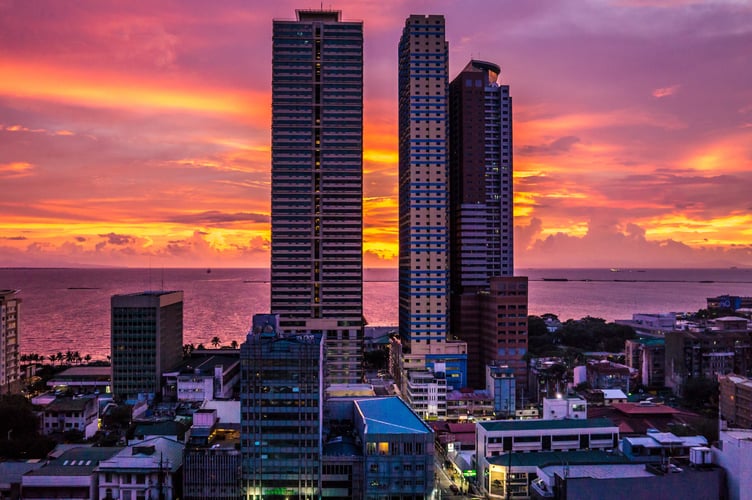A Manx government agency wants to attract offshore gaming operators from the Philippines - despite concerns about alleged links to cyber-fraud, human trafficking, kidnapping, extortion and money laundering.
Digital Isle of Man has agreed funding of £15,000 to visit Manila this week to ‘explore opportunities to attract credible operators’.
In its sights are Philippine Offshore Gaming Operators (POGO), which were banned this year by President Ferdinand Marcos Jr amid concerns over alleged links to criminality.
The Filipino gaming regulator was given until the end of the year to shut the businesses down.
Mr Marcos said in his address: ‘Disguising as legitimate entities, their operations have ventured into illicit areas furthest from gaming such as financial scamming, money laundering, prostitution, human trafficking, kidnapping, brutal torture, even murder.’
The £15,000 funding for the exploratory trip to Manila was unanimously approved at a board meeting of the executive agency on October 3.
Chairman Phil Adcock said the aim was ‘to explore opportunities to attract credible operators based in the region who will be affected by the enactment of recent changes in regulation’.
The board acknowledged securing banking services for relocating businesses remained a challenge and it noted ‘reluctance from some local businesses to collaborate with entities from certain regions, potentially limiting opportunities’.
It stressed the importance of exploring these opportunities while being mindful of the associated risks. Quicker licensing options exist, it noted, but these can ‘impact credibility, making the Isle of Man's approach more appealing for some businesses’.
A spokesperson for Digital IoM said: ‘Following conversations with businesses operating within the island’s digital sector, it was recognised that recent regulatory changes in the Philippines affecting Philippine Offshore Gaming Operators could present a strategic opportunity for the Isle of Man.
'The blanket ban imposed by the Philippine regulator creates a significant displacement of the sector, meaning legitimate and high-performing businesses operating there are required to seek alternative regulatory markets. Consequently, the Isle of Man, known for its robust regulatory standards in this space, could provide this alternative for those businesses which would meet these high standards.’
The spokesperson said Digital Isle of Man had consulted with ‘industry stakeholders to understand both the opportunities and risks posed by the regulatory change in the Philippines’, and the initial exploratory trip to Manila aimed to assess the ‘viability and credibility of potential operators’, as well as meeting regulatory representatives.
They added: 'Given existing relationships that some Isle of Man companies maintain in this region, at this stage the on-site exploration aims to understand the current landscape on the ground and identify any potential operators with the integrity and standards required to operate within the Isle of Man.’
Digital IoM chief executive Lyle Wraxall is currently on the visit to Manila with a member of the strategic partnership team.
Platforms targeting overseas gamblers in the Philippines were legalised in 2016. POGO hubs were established, with the industry employing hundreds of thousands of foreigners and Filipinos at its peak.
But the UN reports states: ‘Despite being established explicitly to regulate offshore online gambling operations, the POGO system has proven highly controversial due to its inability to cope with widespread criminality.
‘Major law enforcement operations have uncovered criminal networks operating under registered Philippine Offshore Gaming Operators (POGOs), alongside illegal POGOs and other zones controlled by criminal actors.
‘These areas have housed transnational criminal groups engaged in a wide array of illicit activities. This includes cyber-enabled fraud, human trafficking, kidnapping, extortion, and groups providing cybercrime and money laundering-as-a-service, with some implicated in major global money laundering investigations.
‘This ultimately led to President Marcos of the Philippines declaring a nationwide ban on POGOs.’
The report notes that despite the ban, authorities have expressed concerns over how entrenched illegal offshore gaming operators have become, with hundreds of POGOs continuing to operate despite previously having their licenses cancelled.
The spokesperson for Digital IoM said: ‘The Isle of Man’s eGaming licencing regime prioritises stringent corporate governance, especially with regards to AML/CFT/KYC requirements, with its governing principles centred around robust player protection standards.
‘It is these standards which have established the Isle of Man as a globally recognised tier 1 regulatory environment, and a responsible and reputable international partner.
‘Serious and organised transnational crime is a global threat, and the Isle of Man is committed to playing its part in disrupting this activity and preventing the island, its people and economy from being exploited.
‘This extends to ensuring our processes and regulations reflect this commitment, continually evolving in response to increasingly sophisticated tactics of exploitation.
‘As has recently been demonstrated, the island’s regulatory and law enforcement agencies take a zero-tolerance approach to any and all criminal activity. They will continue to respond swiftly and robustly to prevent, identify and disrupt any criminal activity, using the full force of the law.
‘The Isle of Man Government continues to work collaboratively with all relevant agencies to ensure the Island and its economy cannot be exploited by criminals.’


.jpeg?width=209&height=140&crop=209:145,smart&quality=75)
.png?width=209&height=140&crop=209:145,smart&quality=75)
